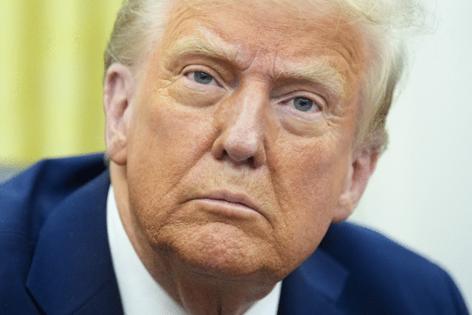Trump hits China, Canada, Mexico with tariffs in trade war
Published in News & Features
WASHINGTON — President Donald Trump unleashed the first salvo of his tariff war, with general levies of 25% on Canada and Mexico and 10% on China — the start of a wave of promised trade barrages against foreign allies and adversaries alike.
Trump signed orders for the tariffs Saturday, according to White House officials who briefed reporters on condition of anonymity. They go into effect on Tuesday, they said.
The orders also include retaliation clauses that would increase U.S. tariffs if the countries respond in kind. The tariffs issued on Saturday will be on top of existing trade levies on those countries.
Energy imports from Canada will be spared from the full 25% levy and will face a 10% tariff. The White House officials said that was intended to minimize upward pressure on gasoline and home-heating oil prices.
The order also revoked the so-called de minimis exemption for small parcels and packages, one official said, which will apply tariffs more widely to small shipments and impact e-commerce and online retailing. The U.S. loses a tremendous amount of tariff revenue by using the exemption, one official said.
The move threatens to have sharp economic impacts for the U.S. and the nations targeted. The countries are the largest three sources of U.S. imports, accounting for almost half of total volume.
Parts of the U.S., including the Pacific Northwest and Northeast, are deeply reliant on electricity or gas flows from Canada. And oil industry advocates have warned against even a 10% increase in the cost of crude inputs into Midwestern refineries that have few near-term options to substitute with U.S. supplies.
Markets have been gripped by uncertainty as they awaited Trump’s decision on the tariffs and there are looming questions about how the levies will impact stocks.
In the 10 days since Trump’s initial tariff threat on his first full day in office, the S&P 500 Index was essentially flat while equity benchmarks in Europe, Canada and Mexico were all higher. The Nasdaq Golden Dragon Index — comprised of companies that do business in China but trade in the U.S. — jumped more than 4%.
Automakers such as General Motors Co., Ford Motor Co. and Stellantis NV, which have global supply chains and massive exposure to Mexico and Canada, could see significant swings.
Trump had long promised the tariffs, delivering on a threat that aims to punish the trading partners for what he says is a failure to prevent the flow of undocumented migrants and illegal drugs, though he had also teased the possibility of a reprieve if Mexico and Canada took steps to address his concerns. Both did, but it wasn’t enough. Trump said flatly this week he’d proceed, and said Friday there was nothing the countries could do to stop him.
Officials on the call Saturday justified the tariffs by citing the flow of fentanyl and other illegal drugs across the border, as well as illegal immigration.
US officials informed Canada on Saturday that the tariffs would be implemented on their goods on Tuesday, according to people familiar with the situation. Prime Minister Justin Trudeau is expected to speak on the tariffs after they are implemented on Saturday.
The Trump administration has regularly warned Canada that any retaliatory tariffs would lead the U.S. to escalate its own measures — raising the prospect of a spiraling trade war, according to an official familiar with the situation.
Canada is set to impose retaliatory countertariffs, the nation’s natural resources minister said in an interview on Friday.
“We will focus on tariffing American good that actually are sold in significant quantities in Canada, and especially those for which there are readily available alternatives for Canadians,” Jonathan Wilkinson said.
Former Canadian Finance Minister Chrystia Freeland, a candidate to succeed Justin Trudeau as prime minister, suggested hitting Trump ally Elon Musk directly by applying a 100% tariff on Tesla Inc. electric vehicles.
———
(With assistance from Thomas Seal, Brian Platt and Alex Vasquez.)
©2025 Bloomberg L.P. Visit bloomberg.com. Distributed by Tribune Content Agency, LLC.







Comments